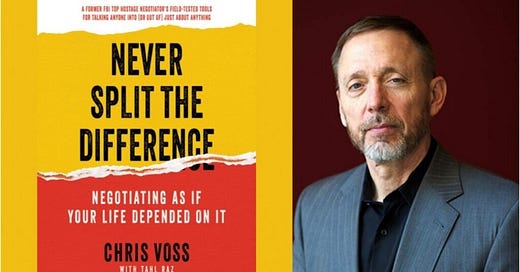TLDR:
Question: Why didn’t they teach this in school?
Answer: Because, back then, you would not have enough cognitive ability, prior knowledge, and psychological/social competence to understand those subjects.
This is a rather long post.
I’m a huge fan of Chris Voss, the author of Never Split the Difference. He used to work as the lead international kidnapping negotiator for the Federal Bureau of Investigation (FBI). And before that, he had served as the lead Crisis Negotiator for the FBI, and was a member of the Joint Terrorist Task Force for 14 years.
And, during his 24-year tenure with the Bureau, he was trained in the art of negotiation by not only the FBI, but also Scotland Yard and Harvard Law School.
What am I sharing these for? Because: he didn’t learn these skills in school. He learned the art of communication and hostage negotiation way later in his adult life.
The Newsletter
As a fan boy, I have been following him all over the social media and have subscribed to his newsletter as well.
But the Dec 5th, 2024 newsletter disappointingly made me go:
“OH NO, even Chris Voss?”
This was the message:
The other day, someone told me, “If your book had been part of my school curriculum, a lot of the problems I faced growing up could’ve been prevented.”
Every time I hear something like that, it brings me back to one simple truth: one of the biggest issues in life is that nobody taught us how to communicate.
Think about it.
We’re taught math, science, history—but where’s the lesson on how to talk to people? How to listen? How to navigate conflict without burning bridges?
It’s like we’re sent out into the world with all these skills, but none of them are the tools we need to handle everyday negotiations that define our lives.
The reality is, everything is communication.
From your career to your relationships, your success depends on how well you connect with others; how well you understand and are understood.
Yet most people stumble through life without ever learning how to do it right.
For a naive reader, this makes sense.
“Why didn’t your school teach you these essential skills of communication and negotiation? You never used Algebra. You never used Trigonometry in your life. What a waste. Instead of those, school should have taught us about life, leadership, finance, entrepreneurship.”
I can understand this frustration.
Naive Realism around How Learning Happens:
Here’s a very interesting new study titled “The illusion of information adequacy” which is about leadership and decision-making.
The finding:
People with limited knowledge tend to overestimate their competence and assume they know enough to make decisions.
Now remember, the participants of this research are all adults. With real-life experiences and world knowledge.
The participants had to come up with a solution. Here’s the scenario:
There’s a school based in an area where a local source of water was drying up. Because of this, the school had to make a decision: either stay put and hope for more rain, or merge with another school in an area with more water.
Here’s the kicker. The researchers deliberately hadn’t provided enough information though. However, the participants believed the information they have was enough to allow them to make good decisions, and that others would agree with them given the same info.
The real insight from the study was the utter importance of context, knowledge, experience, and available information for any one to be able to make decisions.
Decision making is a highly complex skill that is at least,
a) context dependent,
b) domain specific, and
c) information dependent.
Now, let’s come back to the school level education.
The question: Can teachers teach decision making or negotiation to, let’s say, Grade 8 students?
No and Yes.
NO because like other skills, negotiation is not a set of general skills that teachers can teach to students who lack real word experience, domain specific knowledge, and social/psychological competence. Remember, their understanding is still simple, blurry, and shallow.
And YES in a very superficial and simplistic way. May be, they can role-play and practice dialogs but the question is:
Will they be able to understand, retain, and implement the insights in a newer context? In a real context?
In Reality:
When people grumble about “why their schools didn’t teach such important skills like negotiation ”, it’s highly likely that they are over-estimating their level of processing complex skills when they were school students. They have forgotten that once they were naive novice kids, with gaps in their prior knowledge.
Most subjects or skills have an inherent hierarchy. Negotiation builds on a lot of other sub-component knowledge and skills. Like, knowledge and understanding of the issue at hand, communication, language prowess, human behavior, cultural and social awareness, critical thinking, assertiveness, strategy, and a lot of other subsets. These individual skills take multiple years to build.Similarly, they are likely making a mistake of thinking that school students (who are practically novices) can think like adults (who are on a different cognitive, psychological, social level).
Evidently, novices are not mini-experts. They cannot think, see, or process information like experts.And, finally, experts like Chris Voss also suffer from a bias called the “Curse of Knowledge”. Which is unfortunate but expected too. But that’s why they are the experts.
p.s. I’m still a huge fan of Chris Voss.





Big fan of this one. Bravo.